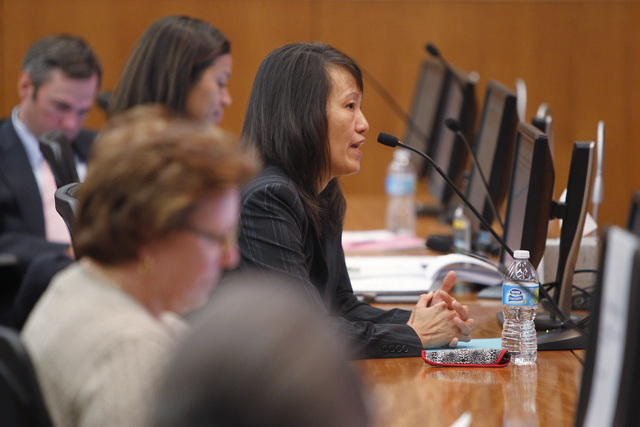Small courts, big problems: North Las Vegas power struggle
North Las Vegas’ city manager tried and failed to oust the Municipal Court’s two judges from an interview panel for new bailiffs last week.
The judges wanted a say in who would be hired to secure their courtrooms, but the city manager argued that wasn’t their place.
“Please be advised that it is not a defensible practice for any elected officials to participate in recruitment interviews,” City Manager Qiong Liu wrote to the city’s court administrator upon hearing the judges’ intention, according to emails obtained by the Review-Journal.
Court Administrator Cindy Marshall wrote back citing a Nevada Supreme Court ruling, saying the judges felt the decision gave the court “sole discretion and power over personnel matters” and therefore the judges would sit in on interviews.
“Every time when they do something wrong the city ends up holding the bag. That’s why it’s my responsibility to advise her to play her role,” Liu said when asked why she told Marshall what to do. The city is in ongoing litigation with one of the Municipal Court judges.
City Attorney Sandra Douglass Morgan ended up getting involved.
Just as the city manager is the decision-maker for City Hall and reports to the City Council, Marshall as court administrator oversees the Municipal Court and answers to its two judges, Douglass Morgan explained.
Marshall said she does answer to the two judges, but the relationship is different than the relationship the city manager has with the council.
The judges have authority to hire and fire court personnel, but in reality they almost always delegate that power to the court administrator, Marshall said.
Because the bailiffs will be in charge of court security, the judges opted to be involved this time and in the end sat in on the interviews, Marshall said.
LOCAL PERSPECTIVES
America’s courts are designed to be independent.
Under the umbrella known as the judicial branch is everything from the small city court to the U.S. Supreme Court, which sets the legal standard for the nation. But the Civics 101 basic of separation of powers, which declares three independent branches of U.S. government — executive, judicial and legislative — can get muddy in small jurisdictions.
The executive branch, which can be a city hall or a county commission, will dole out money to its court and sometimes share resources such as building maintenance or human resources personnel. That collaboration can create confusion or even tension, as it did last week in North Las Vegas.
A power struggle between a city hall and its municipal court resulted in a Nevada Supreme Court decision that sent the city of Sparks to the Legislature last week to ask for permission to amend the city’s charter to comply with a court order. That case — decided in 2013 — found that Sparks was giving city government undue power over court personnel, infringing on the court’s independence. City Hall had tried to reduce court employee pay and the court fought back.
The Sparks decision was what North Las Vegas Municipal Court used for the basis of its argument with the city manager.
In Henderson, judges are kept apprised of the marshal hiring process and give input, but have never sat in on interviews, said Bill Zihlmann, the Municipal Court administrator.
Henderson has 15 marshals. When there are openings, court officials coordinate with the city’s Human Resources Department to advertise and screen applicants.
That kind of collaboration, sharing of human resources, is efficient and saves taxpayers but is also a fault line.
“Yes you can operate on your own, but are you really able to do so?” is how Douglass Morgan summed up the continued struggle.
Additionally, some court employees are union members and have bargaining agreements that the city negotiated. The Sparks case didn’t make clear if city-brokered union deals would be valid, she said.
With power comes responsibility — and that means who gets stuck as the named party in a lawsuit. A case is in front of the Nevada Supreme Court now that will decide if Clark County or the District Court was the employer of a fired marshal.
Douglass Morgan said she’s watching that decision closely to see if the litigation further outlines how the two government branches should play their parts.
Review-Journal writer Eric Hartley contributed to this report. Contact Bethany Barnes at bbarnes@reviewjournal.com or 702-477-3861. Find her on Twitter: @betsbarnes.




























